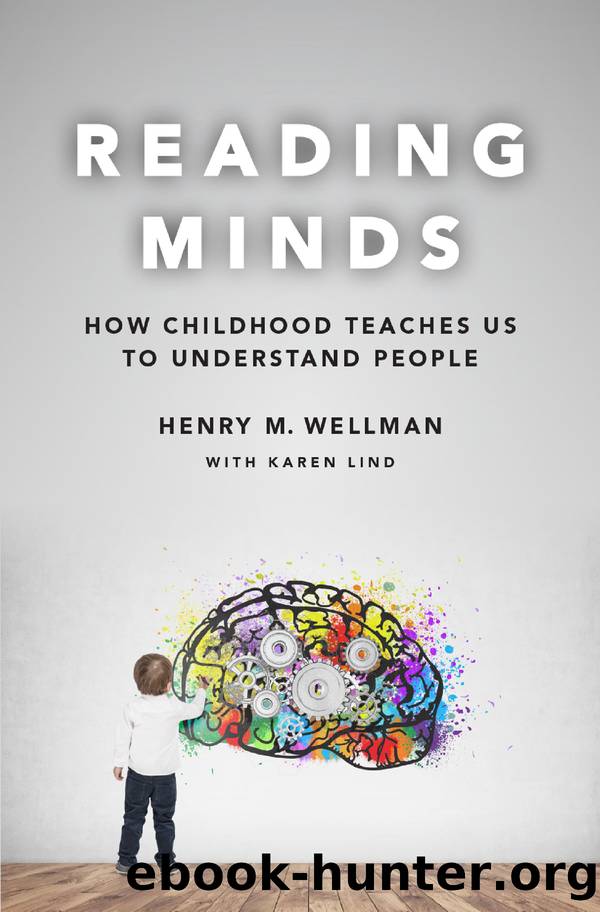Reading Minds by Henry Wellman

Author:Henry Wellman
Language: eng
Format: epub
Publisher: Oxford University Press
Published: 2019-07-15T00:00:00+00:00
This porousness is used in one area only: for private conversation with God.
To revise one’s theory of mind in this way, even though it is “not radically different,” requires sustained work for newcomers to Vineyard. To do the needed work, they are given support from preachers and support and instruction within the church’s prayer groups and “prayer teams.”
Mind Overcomes Reality
Buddhist understandings and teachings about mind provide another counterpoint to Western theories of mind. In Western theory of mind, adults say that thinking occurs in a stream of consciousness: “chain-reaction-like flashings of whole sequences of thoughts, each cueing its successor.” Our everyday understanding is that mental states of perception, knowing, and recognizing connect the inner self to the outer “real” world.
Mahayana Buddhism (“the Great Vehicle”) is one of the two great streams among the many Buddhist teachings and traditions.3 It originated in India a bit before the time of Christ, then spread to Tibet, China, Indochina, Japan, Korea, and beyond.
According to Mahayana Buddhist thought, our everyday understanding and experience of mind is deceptive and flawed. Stream of consciousness is a symptom of a “monkey mind”: unsettled and unsettling, confused and capricious. Further, our belief that the mind connects the self to the real world mires us in cravings—external attractions and repulsions, wants and aversions. Our beliefs about mind, self, and reality perpetuate a malicious interconnection: Monkey mind connects the self to external attractions and repulsions that bounce us around in ignorance and suffering.
Buddha’s great enlightenment was his understanding that mind and reality are fundamentally different from our deceptive, everyday impression. Through practices and guidance, like mindfulness training, Buddhists can instead discover two truths. First, we can control the monkey mind and immerse ourselves in a universal, enduring consciousness, attentive to the present moment, rather than a flitting stream of consciousness. Second, reality consists of blissful serenity rather than a kaleidoscope of thoughts, attractions and repulsions. Buddhist monks have engaged in and perfected these practices and doctrines over centuries. Waves of cultural importation, most recently the Dalai Lama’s appearances, have brought these ideas to the West.
The Baining, the renewalist evangelicals, and Buddhists endorse folk psychologies that are quite different from one another and different from the theory of mind I have described previously.4 Yet, even in the face of these dramatic differences, I am convinced everyday theory of mind, of the sort I’ve talked about, is universal.
Download
This site does not store any files on its server. We only index and link to content provided by other sites. Please contact the content providers to delete copyright contents if any and email us, we'll remove relevant links or contents immediately.
The Art of Thinking Clearly by Rolf Dobelli(8836)
Mindhunter: Inside the FBI's Elite Serial Crime Unit by John E. Douglas & Mark Olshaker(7827)
Change Your Questions, Change Your Life by Marilee Adams(6637)
Nudge - Improving Decisions about Health, Wealth, and Happiness by Thaler Sunstein(6629)
Mastermind: How to Think Like Sherlock Holmes by Maria Konnikova(6225)
The Power of Now: A Guide to Spiritual Enlightenment by Eckhart Tolle(4749)
Men In Love by Nancy Friday(4315)
Factfulness: Ten Reasons We're Wrong About the World – and Why Things Are Better Than You Think by Hans Rosling(4015)
The Confidence Code by Katty Kay(3561)
Thinking in Bets by Annie Duke(3527)
Man and His Symbols by Carl Gustav Jung(3309)
Three Women by Lisa Taddeo(2916)
The Worm at the Core by Sheldon Solomon(2910)
Why Buddhism is True by Robert Wright(2820)
Liar's Poker by Michael Lewis(2805)
The Inner Life of Animals by Peter Wohlleben(2763)
Descartes' Error by Antonio Damasio(2728)
The Power of Mindful Learning by Ellen J. Langer(2705)
The Slow Fix: Solve Problems, Work Smarter, and Live Better In a World Addicted to Speed by Carl Honore(2570)
